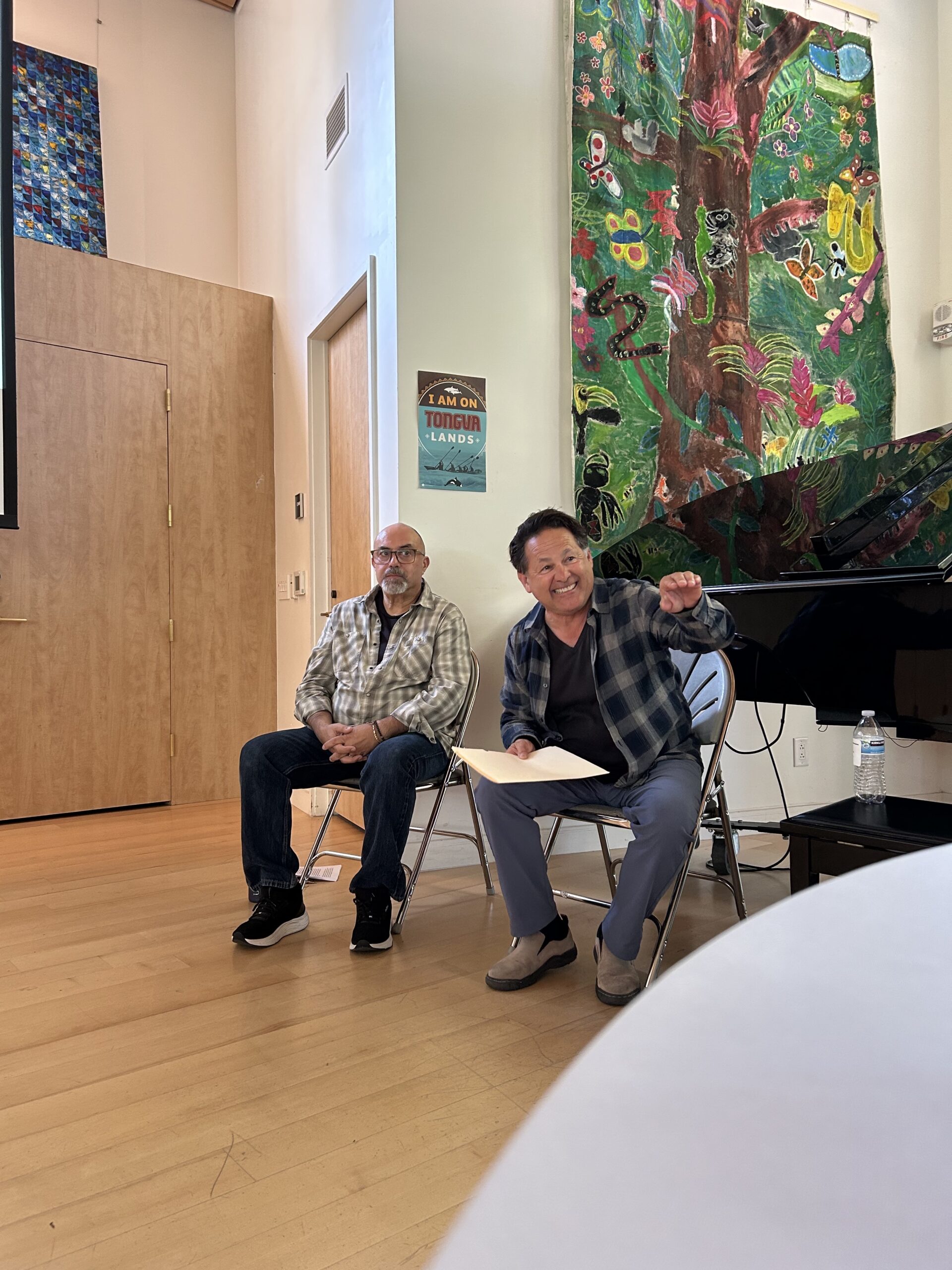New effort aims to foster dialogue and inquiry about critical learning and information issues confronting UCLA and the larger community.
Higher education has been much in the news of late. Student protests and university responses to them have roiled campuses. Colleges and universities have faced political attack over the principles of diversity, equity, and inclusion and use of Critical Race Theory, and confronted by charges of anti-semitism. The Trump administration has cut millions of research dollars and other funding for institutions of higher education, and threatened to cut more. Things are not quiet on the campus quad.
But amid this strife, at least for a few hours earlier this month, faculty members and researchers in the UCLA School of Education and Information Studies came together with community members to join in what many might consider a more accurate reflection of the purpose and role of higher education — to engage in learning, to share and discuss ideas, to talk about what they want and need to learn, plan for how they could go about doing it, and how they can engage with and share what they learn across the communities they serve.
“It was almost as if you could forget about the rest of it,” noted one observer. “At least for a while.”
Fittingly taking place in the Community Hall of the UCLA Lab School, the event served as the launch of “Going Public,” a new initiative at the UCLA School of Education and Information Studies to foster dialogue and inquiry about critical learning and information issues confronting UCLA and the larger community.
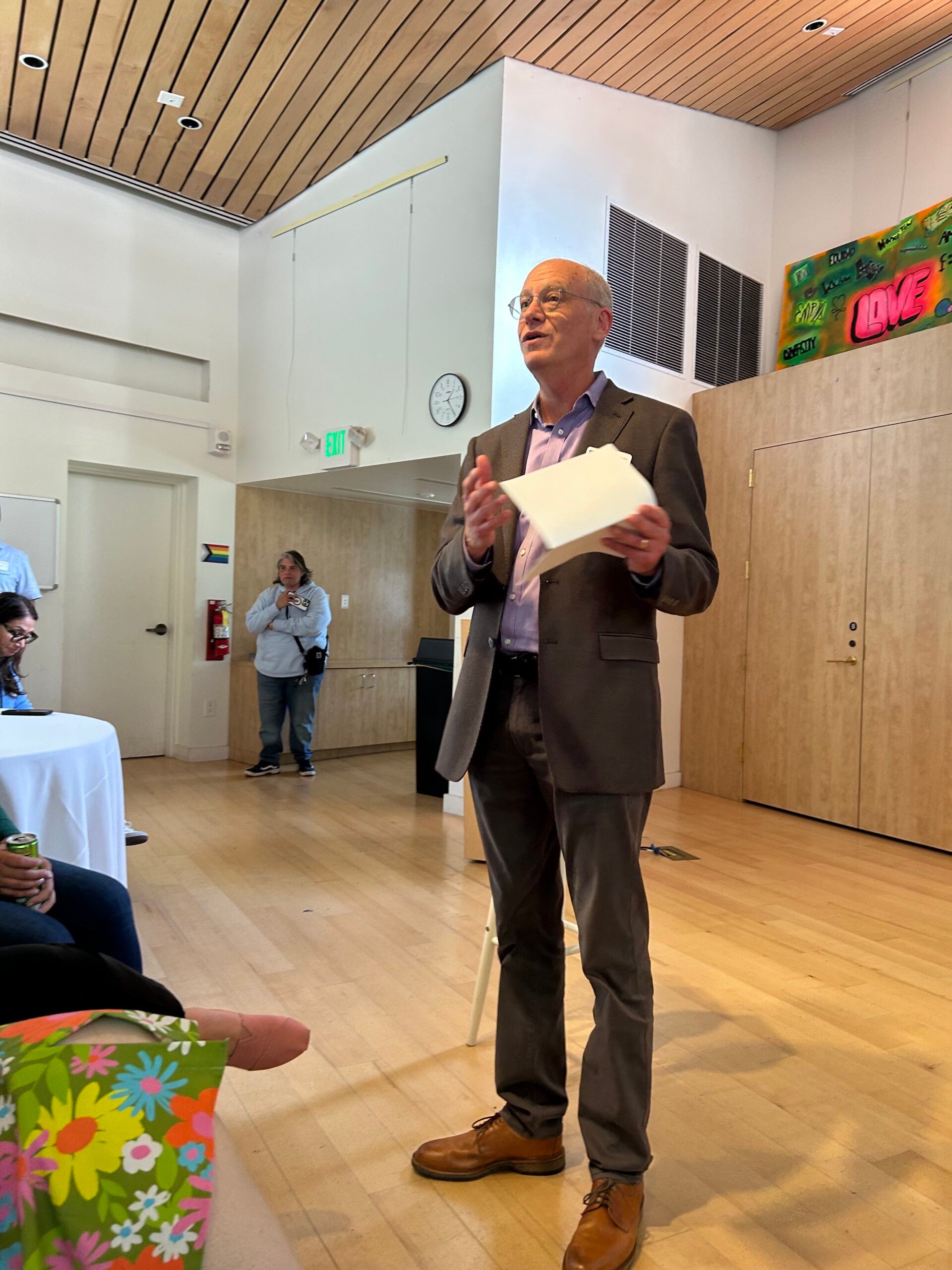
“The idea is to further learning and understanding through public scholarship efforts that draw on the knowledge and assets of our communities in partnership with our scholars at UCLA,” says John Rogers, Professor of Education and the Associate Dean for Public Scholarship at UCLA Ed&IS, who leads the effort.
“At a moment when universities, the arts, and the public itself are under attack, we wanted to lean into public scholarship because we think this is a moment for creation,” Rogers said.
The event served to introduce six new public scholarship projects supported by the Going Public Initiative.
Putting the “public” in scholarship first, the meeting began with the performance troupe Culture Clash sharing personal stories and perspectives of how they and their friends and family members had been affected by the devastation of the recent fires in Altadena and Pacific Palisades.
Accompanied by a pianist and trombone player, the troupe shared their early take of a theatre presentation drawing on interviews about the fires. The effort is part of “Through the Fire: Culture Clash Recovering Community Memory,” an oral history project with UCLA Associate Professor of Education and History, David G. García, one of only a handful of historians across the country documenting Chicana/o community histories of education.
“Culture Clash brings audiences the narratives of those on the margins of society, from hurricane survivors in Florida to U.S. veterans living in Tijuana, to the displaced families of Chavez Ravine, to the artists of Chicano Park in San Diego,” said García.
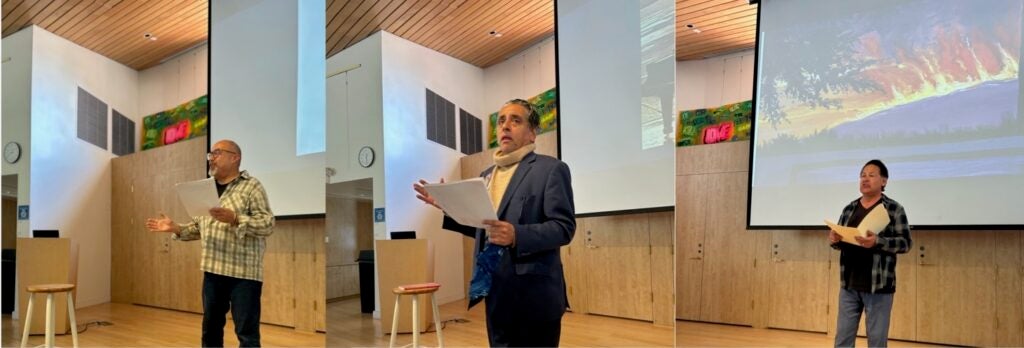
“They are thrilled to be in community with us today as all eyes seem to be on the nation’s institutions of higher education, and to be locked in arms with scholars and educators in the broader community at this critical time in our nation’s history to do their part in helping to make sense of the recent catastrophes in our region,” García noted in his introduction.
The opening by Culture Clash was followed by brief descriptions from UCLA Ed&IS faculty members, research staff and community members of the goals and hopes of their public scholarship projects.
Assistant Professor Chris Jadallah introduced plans for “From the Ground Up,” a partnership with Black Thumb Farm in Panorama City to foster understanding of garden-based learning among ethnic studies teachers.
Michelle Caswell, Professor of Archival Studies in the UCLA Department of Information Studies introduced, “Resurrecting El Barrio: Digitally Mapping El Monte’s Hicks Camp.”
Caswell, who also serves as a special advisor to UCLA Executive Vice Chancellor and Provost Darnell Hunt on community-engaged scholarship, described plans for working in partnership with the La Historia Historical Society and Museum, a community-based archive in El Monte, to digitize a map of the Mexican American community in the 1940s. The partnership includes Melissa Villa-Nicholas, assistant professor, and Miriam Posner, associate professor, in the the UCLA Department of Information Studies; and Rosa Peña and Bianca Sosa Phal of La Historia Historical Society.
“There is a map on display in the (El Monte) archive with push pins and yarn connecting the map to photographs of people and other documents, like a CSI investigation. I was so entranced by this map,” Caswell said. “It’s just a beautiful example of the care at community archives and the way they work miracles with very little resources.”
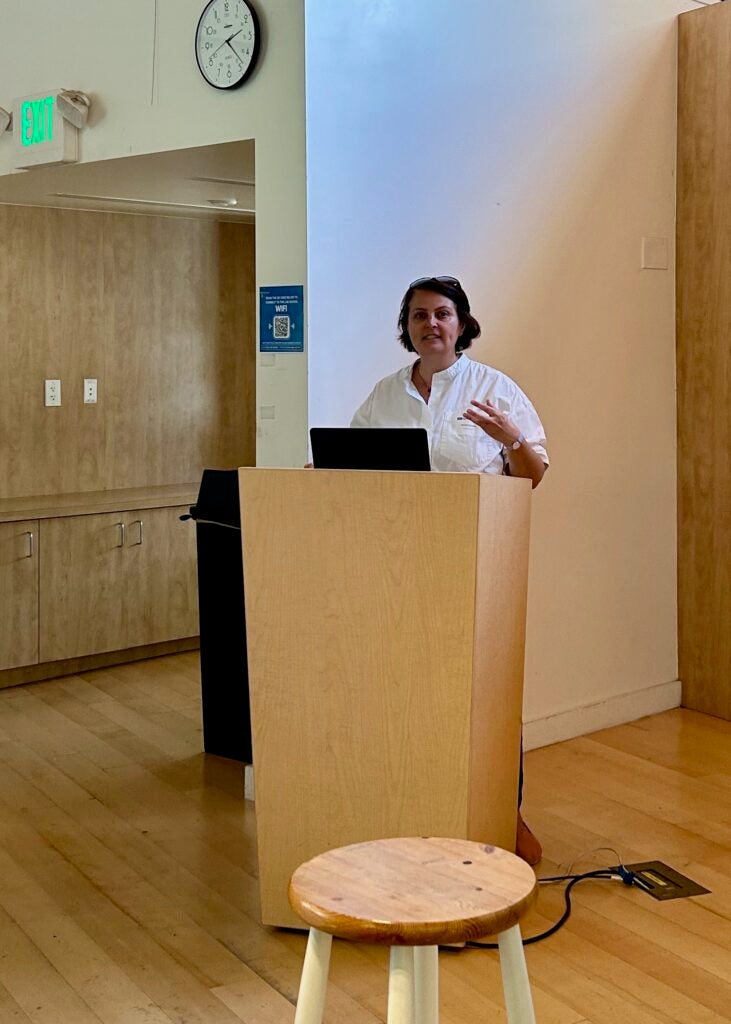
“The map has people’s names, it has their nicknames, it has the names of parks, of fields, and churches. You really get a sense of the breadth and depth of that community by looking at this map.”
“They were doing some preservation treatment, you could tell that at some point it had been torn a little, and I was talking with Rosa (Peña), the executive director, and she said, ‘I would love to digitize this.’”
Out of that discussion grew “Resurrecting El Barrio” a community-engaged participatory action research project. Three faculty members from UCLA’s Department of Information Studies and two students from the Master of Library and Information Science (MLIS) program will collaborate with the community archive to create an interactive digital map of Hicks Camp, a historic Mexican American community in El Monte.
The project will use a Graphic Information System (GIS) to create a layered interactive digital map that will enable El Monte’s Mexican American community members to add digitized photographs, archival records, and audio files, adding layers of history. The map will be shared at public events at La Historia and will be freely available online for educational use. The project will serve as a model for communities to digitally recreate lost geographies, catalyzing new historical evidence and enabling communities to see themselves in history.
“I think this map provides a real opportunity to think about how you archive a space that no longer exists. That question, I think, has a lot of resonance across all of these projects,” Caswell concludes.
The project, “Plans for Lessons in Resilience: Stories of Recovery after the Eaton Fire,” was introduced by Amparo Chavez-Gonzalez and Danny Diaz of the UCLA History-Geography Project. Along with Professor of Education Eddie Cole, they are partnering with the Altadena Rebuild Coalition to document and share the experiences of teachers in Altadena in the wake of the fire.
Ivy Zucaya, Research Director, and Taylor Dudley, Executive Director, of the UCLA Pritzker Center for Strengthening Children and Families, shared plans for “The Aftermath of the Eaton Fire: Foster Care and Education Disrupted.” The project will examine how the Eaton Fire in Altadena disrupted education for children in foster care and consider the responses needed to address the effects of displacement. The LA County Department of Children and Family Services will serve as the community partner for the project.
Gregory Leazer, an associate professor in the UCLA Department of Information Studies, introduced ”Lab Forward in the Community: Support and Critique of Artificial Intelligence in Community Libraries.” The project is hoping to pilot curriculum and instructional support around artificial intelligence at Río Hondo College and the Braille Institute Library.
Leazer, who lives just a few blocks from the neighborhood devastated by the Eaton Fire, talked of feeling the heat from the flames and the displacement he and others have felt in the aftermath of the fires.
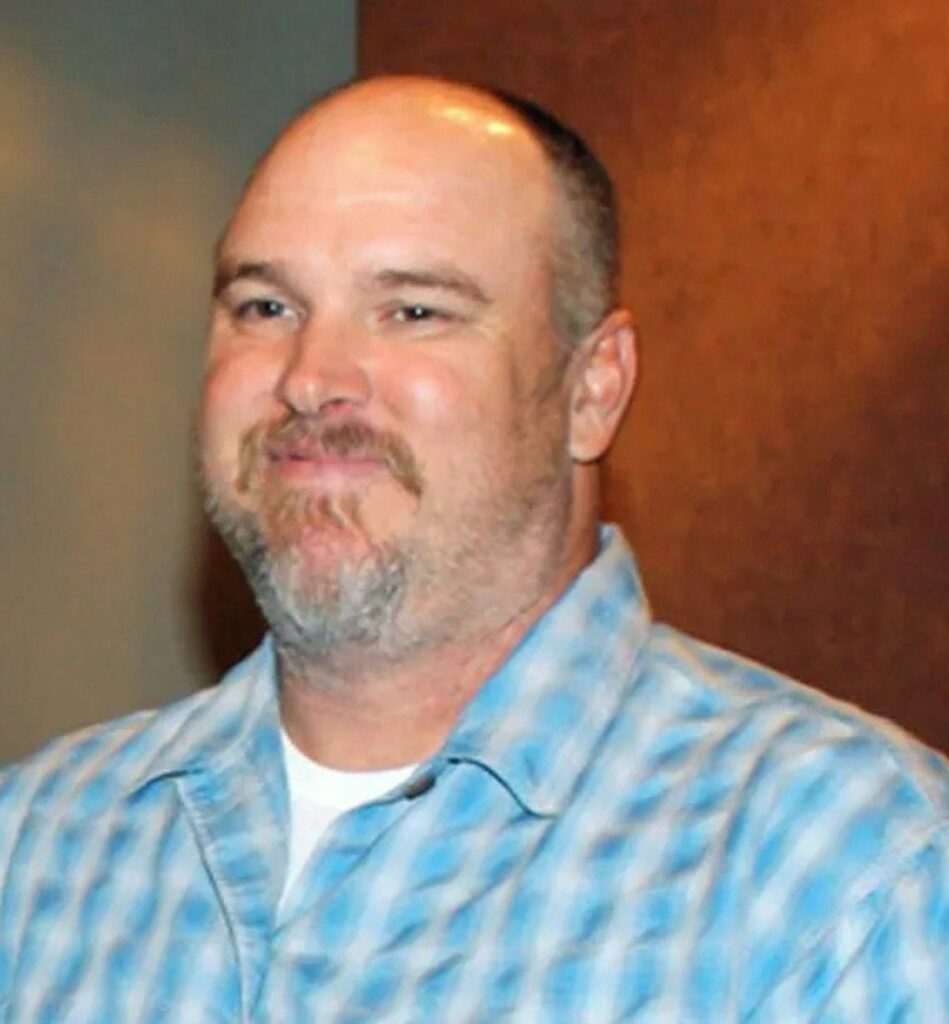
Leazer told of standing on a dark street in his neighborhood a few nights after the fires, talking with a neighbor under a streetlight on the corner. His story offers not only insight into the challenges and potential of the use of AI but also perhaps a metaphor for the role of public scholarship going forward.
“When you’re under a street light, you’re illuminated. But because of the glare, you can’t see what’s happening 25 feet in front of you. What is visible when you walk in the dark is rendered invisible because of the glare of the light,” said Leazer.
“What we are working on here is to think about how AI will transform knowledge. The glare of AI may render other ways of knowing invisible or hard to see.”
“The whole spirit (of our project) is to develop critical AI literacies where people might learn to adapt AI to their own needs. My metaphor might be that we need to pick up that street light and turn that lens into the dark corners where we really can’t see, to see what we once could.”
“We are just getting started.”
Above: Herbert Sigüenza and Ric Salinas of the performance troupe Culture Clash open up a UCLA Ed&IS Going Public event.
Photos by John McDonald.
